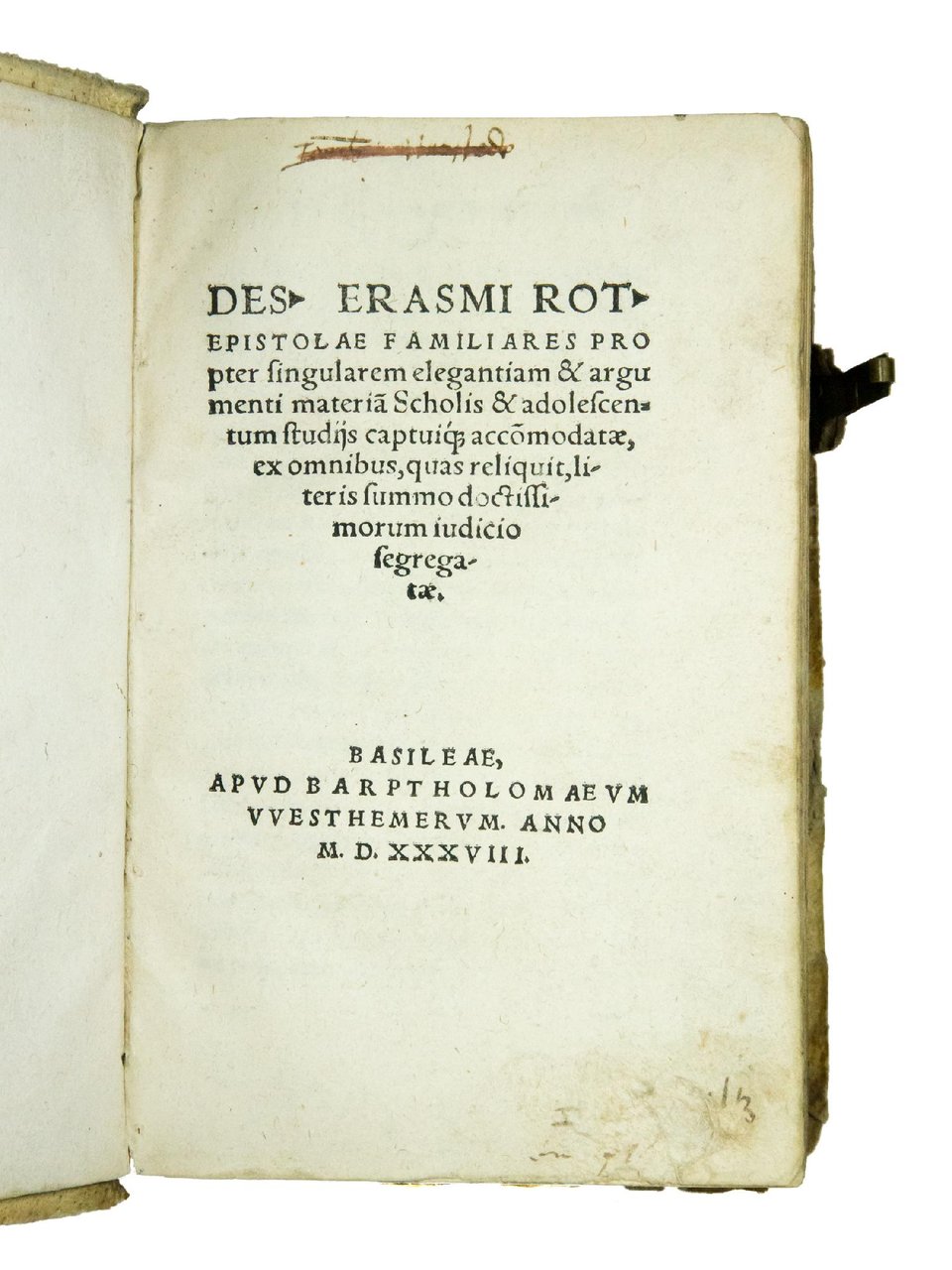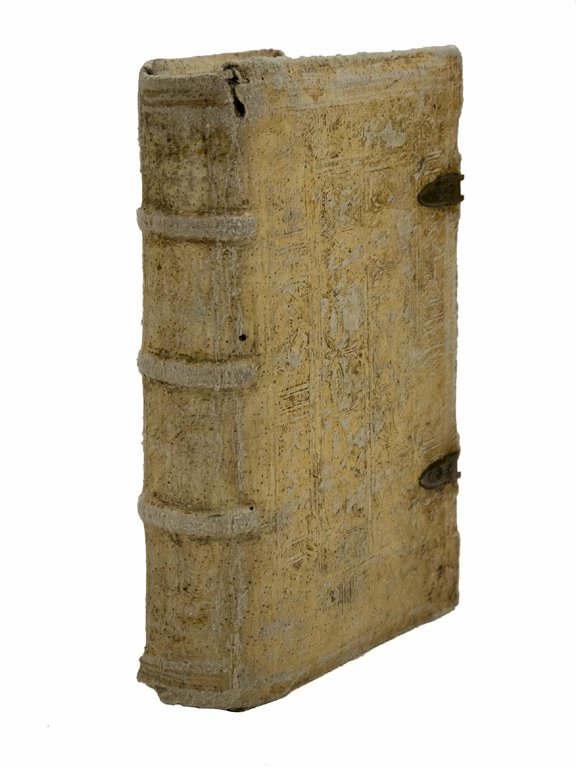

Livres anciens et modernes
ERASMUS, Desiderius (1466-1536)
Epistolae familiares propter singularem elegantiam & argumenti materia(m) Scholis & adolescentum studiis captiviq(u)e acco(m)modatae, ex omnibus, quas reliquit, literis summo doctissimorum iudicio segregatae
Bartholomaeus Westheimer, 1538
1800,00 €
Govi Libreria Antiquaria
(Modena, Italie)
Les frais d'expédition corrects sont calculés une fois que l'adresse de livraison a été indiquée lors de la création de la commande. Un ou plusieurs modes de livraison sont disponibles à la discrétion du vendeur : standard, express, economy, in store pick-up.
Conditions d'expédition de la Librairie:
Pour les articles dont le prix est supérieur à 300 euros, il est possible de demander un plan de paiement échelonné à Maremagnum. Le paiement peut être effectué avec Carta del Docente, Carta della cultura giovani e del merito, Public Administration.
Les délais de livraison sont estimés en fonction du temps d'expédition de la librairie et de la livraison par le transporteur. En cas de retenue douanière, des retards de livraison peuvent survenir. Les frais de douane éventuels sont à la charge du destinataire.
Pour plus d'informationsMode de Paiement
- PayPal
- Carte bancaire
- Virement bancaire
-
-
Découvrez comment utiliser
votre Carta del Docente -
Découvrez comment utiliser
votre Carta della cultura giovani e del merito
Détails
Description
Index Aureliensis, 162.936; VD 16, E-2955; I. Bezzel, Erasmusdrucke des 16 Jahrhunderts in Bayerischen Bibliotheken, (Stuttgart, 1979), 1037; F. van der Haegen, Bibliotheca Erasmiana, I, (Gand, 1893), p. 101.
FIRST EDITION of this selection of Erasmus' letters made from his Opus epistolarum of the same year. The whole volume was intended for school boys as a manual of model letters. The volume opens with the announcement of Erasmus' death and a short biography of the latter by Beatus Rhenanus, and also contains some laudatory verses on Erasmus by Henricus Glareanus and Johannes Sapidus, and an epitaphium by Andrea Alciati. Westheimer reprinted the volume in 1551. The present edition was possibly, although there is no direct evidence, also edited by Johannes Gast (d. 1552), who in 1546 published Desiderii Erasmi Roterodami epistolae familiares in tres centurias divisae.
“Il a une haute idée de la lettre considerée comme un genre littéraire qui ‘peint les moeurs, le destin, les sentiments, les conditions de la vie publique et de la vie privée' tout en maintenenant le ton de la conversation: colloquium inter absentes. Ses préférences vont à la simplicité, au style naturel et familier, à tout ce qui s'écarte résolument des expressions conventionelles, artificielles et impersonnelles. Sans doute, Erasme lui-même n'a-t-il pas toujours suivis ces sages recommandations? Il n'en reste pas moins qu'il n'aurait pu écrire un tel traité épistolaire s'il n'avait été d'abord un gran épistolier. Ajoutons pour mémoire, qu'Erasme n'a pas publié lui-même un recueil de ses plus belles lettres familières. Le volume intitulé Desiderii Erasmi Roterdami epistolae familiares est une édition posthume, chez B. Westhemerus à Bâle en 1538” (L.-E. Halkin, Erasmus ex Erasmo. Erasme éditeur de sa correspondence, Aubel, 1983, pp. 127-128).
Bartholomaeus Westheimer (1499-1567/68) was born at Pforzheim and educated in the Latin school of Johann Sapidus at Schlettstadt. Around 1525 he lived in Rastatt and came into contact with the circle of Reformed theologians like Johannes Brenz and Dietrich von Gemmingen. A year later he settled in Basle as a proofreader, became a citizen and married a former nun. In Basel he issued his first theological works being printed by Thomas Wolff, whose printing shop he eventually took over in 1536. During some of his business trips, he met in Strasbourg the theologian Konrad Hubert with whom he remained in correspondence over a longer period. In 1546 he ceased his activities as a printer and became pastor of Therwil (near Basel) and in 1547 of Mulhouse. In 1551 he returned to Basel and his name is found in the university register. In 1553 he was called as a preacher to Horbourg (near Colmar). With a short stay in Montbéliard (Burgundy) he returned permanently to Horbough.
As a printer he published over one hundred works: classical authors, theological and philological treatises as well as medical tracts, mostly in Latin. As theologian (he had converted from Calvinism to Lutheranism in his later years), he tried to show, combining humanism, biblical studies, and the Church Fathers, that the Reformation is indeed a return to the spirit of the early Church. If he ever had contacts with Erasmus is not known, but it is very probable (cf. H. Rissel, Dem Buch und der Kanzel gedient: Bartholomäus Westheimer aus Pforzheim, 1499?-1567, in: “Neue Beiträge zur Pforzheimer Stadtgeschichte”, Ch. Groh, ed., Stuttgart, 2006, pp. 13-24).
Gerrit Gerritszoon (better known as Desiderius Erasmus) was born at Rotterdam, apparently on October 28, 1466, the illegitimate son of a physician's daughter and a future monk. At Deventer he attended the local school run by the German humanist Alexander Hegius, learning Latin and Greek. On his parents' death he entered the Augustinian Coll

